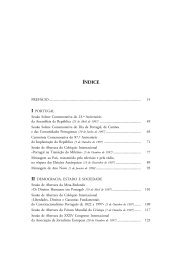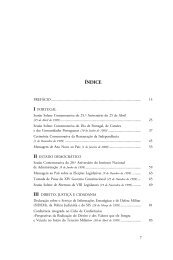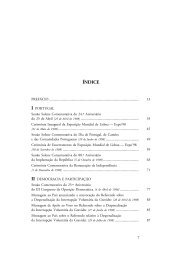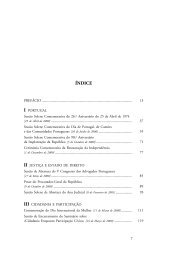- Page 1:
ebatesPRESIDÊNCIA DA REPÚBLICASoc
- Page 6 and 7:
ÍndiceNOTA DE ABERTURA............
- Page 8 and 9:
Nota de aberturaUm dos temas que t
- Page 10 and 11:
Discursodo Presidente da República
- Page 12 and 13:
legitimar a atitude de assumir risc
- Page 14 and 15:
I ParteTecnologia, Instituiçõese
- Page 16 and 17:
Tecnologia, instituiçõese crescim
- Page 18:
era considerado como um aumento da
- Page 22:
Na última década foram feitos mui
- Page 26 and 27:
ia adaptada à produção em massa.
- Page 28 and 29:
empresas que quisessem ter êxito n
- Page 30 and 31:
nas de produtos químicos e de equi
- Page 32 and 33:
II ParteInovação e Atitude Cultur
- Page 34 and 35:
Inovação e atitude culturalJoão
- Page 36 and 37:
Inovação e organizaçãoIlona Kov
- Page 38 and 39:
ficadas de mudança organizacional
- Page 40 and 41:
incerteza, apresentam os problemas
- Page 42 and 43:
e ao inesperado — a capacidade de
- Page 44 and 45:
guirem resultados pouco espectacula
- Page 46 and 47:
parte em teletrabalho) e serão pag
- Page 48 and 49:
e mecanismos de divulgação das no
- Page 50 and 51:
4. Factores de resistência à inov
- Page 52 and 53:
conciliar a competitividade com obj
- Page 54 and 55:
A inovação é percebida pelos dir
- Page 56 and 57:
em as práticas tradicionais refere
- Page 58 and 59:
Numa economia do conhecimento a ino
- Page 60 and 61:
21 E. Mumford, «New treatments or
- Page 62 and 63:
GORZ, André, Misères du présent
- Page 64 and 65:
Inovação e atitude culturalManuel
- Page 66 and 67:
O sector nunca deixou de reivindica
- Page 68 and 69:
Dentro da indústria de calçado h
- Page 70 and 71:
para-se para apresentar uma nova vi
- Page 72:
tiva? O saber tácito, e, principal
- Page 75 and 76:
zar, planificar e executar tarefas
- Page 77 and 78:
e um apropriado planeamento das act
- Page 79 and 80:
Talvez por isso, enquanto nos três
- Page 81 and 82:
A tendência é para pensarmos que
- Page 83 and 84:
DA ESQUERDA PARA A DIREITAJaime And
- Page 85 and 86:
empresas e dos países, como pode l
- Page 87 and 88:
uma preferência estrita pelo créd
- Page 89 and 90:
gamento do conceito de inovação s
- Page 91 and 92:
O diagnóstico deve centrar-se em n
- Page 93 and 94:
Os incentivos financeiros referidos
- Page 95 and 96:
porque representam instituições d
- Page 97 and 98:
para serem mais eficientes, e por s
- Page 100 and 101:
Financiamento da inovaçãoempresar
- Page 102 and 103:
Suponho que seja na próxima décad
- Page 104 and 105:
que se trata de uma dinâmica empre
- Page 106 and 107:
em consórcio? Em primeiro lugar, o
- Page 108 and 109:
Os incentivos fiscais podem ter um
- Page 110 and 111:
Estratégias, apoio e financiamento
- Page 112:
• acções de demonstração;•
- Page 115 and 116:
De um ponto de vista analítico, e
- Page 117 and 118:
financiamentos públicos à inovaç
- Page 119 and 120:
O esforço público global realizad
- Page 121 and 122:
com a informação patente no Quadr
- Page 123 and 124:
Quadro 4Patentes solicitadas nos EU
- Page 125 and 126:
do Orçamento Geral de Estado e com
- Page 127 and 128:
espostas gravita em torno do valor
- Page 129 and 130:
Quadro 8 Estrutura sectorial do PIB
- Page 131 and 132:
3. Quais os factores contingenciais
- Page 133 and 134:
cativa flutuação das orientaçõe
- Page 135 and 136:
• em terceiro lugar, a ausência
- Page 137 and 138:
Notas1 De acordo com informação d
- Page 139 and 140:
HENRIQUES, L., Os sistemas consulti
- Page 141 and 142:
Luc Soete
- Page 143 and 144:
nacionais, tradicionalmente fechado
- Page 145 and 146:
actividades de investigação cient
- Page 147 and 148:
de consumo. Além disso, verificou-
- Page 149 and 150:
Reino Unido e a Espanha se aproxima
- Page 151 and 152:
um conjunto muito mais amplo de mel
- Page 153 and 154:
Isto explica por que razão foram a
- Page 155 and 156:
de conhecimento (os laboratórios d
- Page 157 and 158:
Mudanças institucionais nos mercad
- Page 159 and 160:
debate está a acontecer, é compos
- Page 161 and 162:
tão sistemática e progressiva com
- Page 163 and 164:
ilidade, como forma de ajudar a fin
- Page 165 and 166:
cesso de privatização de empresas
- Page 167 and 168:
padrões semelhantes entre si. Pelo
- Page 169 and 170:
equipamento, transacções internac
- Page 171 and 172:
para as actividades económicas. Es
- Page 173 and 174:
O desenvolvimento de um conjunto de
- Page 175 and 176:
Argumentou-se que há quatro áreas
- Page 177 and 178:
ver mudanças a breve trecho na hie
- Page 179 and 180:
Notas1 Na estrutura do programa de
- Page 181 and 182:
DA ESQUERDA PARA A DIREITAJosé Sal
- Page 183 and 184:
tema Nacional de Inovação, sejam
- Page 185 and 186:
Um tal desenvolvimento não foi esp
- Page 187 and 188:
decorrentes, têm que ser vistos em
- Page 189 and 190:
matéria de progresso técnico da a
- Page 191 and 192:
ciante incepção, através da cria
- Page 193 and 194:
tipos distintos de «modos inovató
- Page 195 and 196:
tivo (e curioso), ainda, é apontar
- Page 197 and 198:
No que concerne os centros tecnoló
- Page 199 and 200:
NotasAs opiniões expressas pelo au
- Page 201 and 202:
-da-arte estritamente importadas pa
- Page 203 and 204:
quase quinhentos anos foram pobres
- Page 205 and 206:
elas, e que essa diferença esconde
- Page 207 and 208:
c) Por fim, devemos investir essa n
- Page 209 and 210:
Este processo de digestão é equiv
- Page 211 and 212:
extraí a seguinte ideia sobre os i
- Page 213 and 214:
organização, o que se faz atravé
- Page 215 and 216:
Na moderna economia do conhecimento
- Page 217 and 218:
tativo das tecnologias incorporadas
- Page 219 and 220:
am o maior ou menor sucesso económ
- Page 221 and 222:
posto em relevo o sucesso técnico
- Page 223 and 224:
participação pública nos riscos
- Page 225 and 226:
Figura 6Evolução das receitas dos
- Page 227 and 228:
A Figura 9 mostra a estrutura de re
- Page 229 and 230:
Figura 11Orçamentos das agências
- Page 231 and 232:
DA ESQUERDA PARA A DIREITAHenrique
- Page 233 and 234:
essencial, que, em regra, dá orige
- Page 235 and 236:
aprendizagem, todos aprendem: as es
- Page 238 and 239:
Trabalho, formação e inovaçãoMa
- Page 240 and 241:
Gostava de deixar uma outra linha d
- Page 242 and 243:
Uma estratégia portuguesaHenrique
- Page 244 and 245: custos de entrada no mercado e cons
- Page 246 and 247: Trabalho, formação e inovaçãoNo
- Page 248 and 249: de adaptação, e ao reforço das p
- Page 250 and 251: Com efeito, essa comissão não foi
- Page 252 and 253: sidades de aprendizagem e grau de a
- Page 254 and 255: ecurso ao teletrabalho e a redes de
- Page 256 and 257: estruturais da economia e da utiliz
- Page 258 and 259: A importância da formação nas em
- Page 260 and 261: temas de aprendizagem e formação
- Page 262 and 263: Os efeitos sobre as condições de
- Page 264: Anexos
- Page 267 and 268: I ask you to recognize that both th
- Page 269 and 270: sions that were actually profit max
- Page 271 and 272: As my remarks above indicate, while
- Page 273 and 274: same broad industry. Thus, pharmace
- Page 275 and 276: equired. Chandler’s own studies a
- Page 277 and 278: neering schools, in particular MIT,
- Page 279 and 280: nal Japanese competition was strong
- Page 281 and 282: and liberalised. The resulting grow
- Page 283 and 284: In the second section, a brief over
- Page 285 and 286: Figure 1Real GDP 1991-1999(1991 = 1
- Page 287 and 288: might have influenced negatively Eu
- Page 289 and 290: knowledge, linked to the emergence
- Page 291 and 292: sible than before to all sectors an
- Page 293: more creative responses to external
- Page 297 and 298: which study curriculum to follow. A
- Page 299 and 300: Systems were so different accross E
- Page 301 and 302: experienced with the salaries of CE
- Page 303 and 304: The internationalisation of nationa
- Page 305 and 306: adjust to higher risk levels. The c
- Page 307 and 308: This, increasingly massive componen
- Page 309 and 310: of «market services». Most of the
- Page 311 and 312: Notes1 Within the framework of the
- Page 313 and 314: SOETE, L., «The Challenges and the






